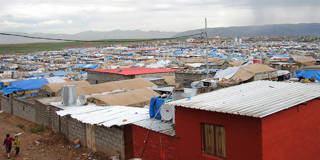Syria’s seemingly endless civil war, waged without regard for international law, has left countless civilians at fate’s mercy. The international community should have done more to prevent this disaster; now it has become this generation’s greatest humanitarian challenge.
NEW YORK – After more than a thousand days of death and misery, two important recent public statements show why policy toward Syria must enter a new phase of intensity and focus. Last month, US President Barack Obama, in setting out his broader foreign-policy stance, spoke of Syria’s three evils – brutal military tactics, the terrorist threat from the opposition, and the need to support refugees. A week earlier, the United Nations Office for the Coordination of Humanitarian Affairs reported excruciating details of Syria’s humanitarian crisis, including citizens under fire from all sides, sustained government barrel-bomb attacks, and shortages of food and medicine.

NEW YORK – After more than a thousand days of death and misery, two important recent public statements show why policy toward Syria must enter a new phase of intensity and focus. Last month, US President Barack Obama, in setting out his broader foreign-policy stance, spoke of Syria’s three evils – brutal military tactics, the terrorist threat from the opposition, and the need to support refugees. A week earlier, the United Nations Office for the Coordination of Humanitarian Affairs reported excruciating details of Syria’s humanitarian crisis, including citizens under fire from all sides, sustained government barrel-bomb attacks, and shortages of food and medicine.